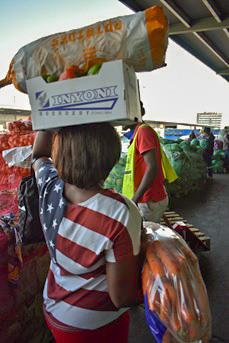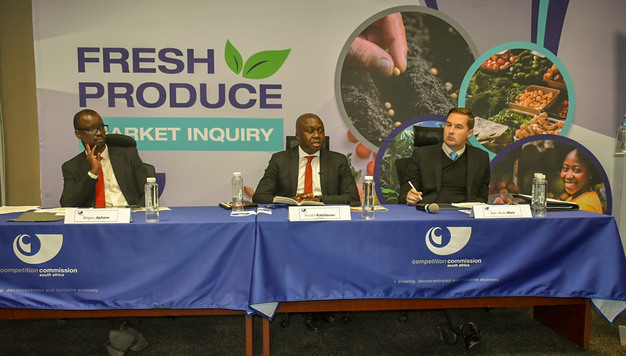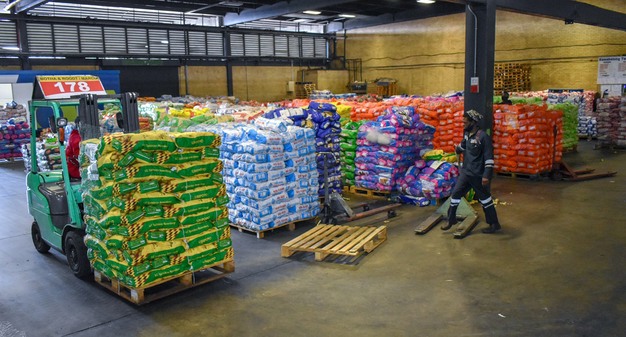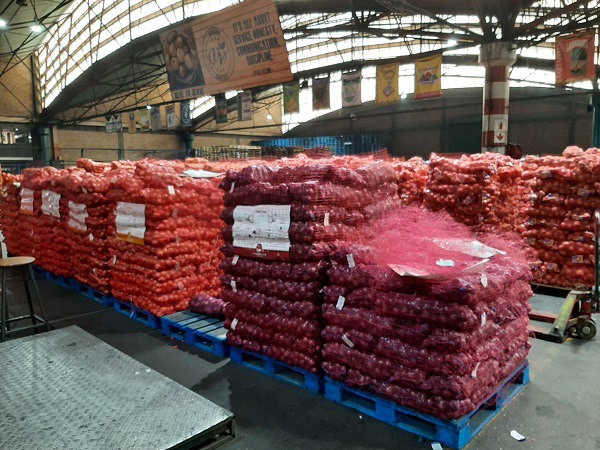 Some points of accord with the industry – the need to ringfence income generated by fresh produce markets and to invest in its ailing infrastructure – and some points sure to ruffle feathers in the Competition Commission's provisional report on its wide-ranging inquiry into the fresh produce value chain, from the price of seeds and water rights to retail floor space.
Some points of accord with the industry – the need to ringfence income generated by fresh produce markets and to invest in its ailing infrastructure – and some points sure to ruffle feathers in the Competition Commission's provisional report on its wide-ranging inquiry into the fresh produce value chain, from the price of seeds and water rights to retail floor space.
Right: a buyer at the Johannesburg fresh produce market.
The domestic fresh produce market is estimated at over R53 billion (2.7 billion euros) annually, of which about R21 billion (1.08 billion euros) is sold through the national wholesale markets and R32 billion (1.6 billion euros) through formal retail.
The Commission has previously investigated allegations of price fixing by several market agencies, but since the matter is currently before the Competition Tribunal, it was left out of this inquiry. Practices by market agents such as stock reservation and reserve buying and credit sales could distort price discovery, it notes.
Despite the purposely low barriers to entry of South Africa's wholesale markets which ought to ease the entry of small-scale and historically disadvantaged farmers, the reality does not bear out the ideals with which the markets were created (ironically for the same purpose, except with white farmers as its target). "It has been estimated that less than 1% of the gross value of sales at national fresh produce markets comes from smallholder or historically disadvantaged farmers," noted Hardin Ratshisusu, deputy commissioner of the Competition Commission. They would like to see a 10% annual increase in sales from these groups.

Mogau Aphane, principal analyst at the Competition Commission, with Hardin Ratshisusu, deputy commissioner, and Adv Ruan Maré
Old ties between producers and traders impede competition
And it's not only black farmers who are finding it difficult to make inroads at the markets, but black market agencies whose share of trading volumes at these markets is equally at less than one percent of proceeds at the wholesale markets, and among them survival rate is low.
Without potatoes, onions, tomatoes, and bananas, a market agency cannot compete. The dominant agencies understand this, and there are longstanding relationships between the largest agencies and some of the largest growers of these crops.
"Despite preferential allocation of floor space on the market trading floors, HDP [historically disadvantaged] market agents have been impeded from participation by not being able to obtain fresh produce from large established farmers due to longstanding relationships they have with their preferred market agents. In short, this issue means that even though HDP agents have prime trading floor space at the largest national fresh produce markets, that space is often poorly stocked as they do not have a regular supply of produce."
The Commission decided against imposing mandatory BEE (black economic empowerment) ownership on existing agencies. The report notes that previous skills transfer and training programs run by market agencies have been successful, and it wants the dominant agencies – the RSA Group, Subtropico, the Grow Group, Dapper, and Prinsloo & Venter Market Agents - to follow this precedent.

Potatoes at the Johannesburg market.
Large commercial farmers should use market influence
Fresh produce markets should adopt programs to introduce black-owned market agencies to markets where none are currently active, and the same is expected from large farming enterprises with an annual turnover of more than R35 million (1.8 million euros) and more than 250 full-time employees to assist in setting up black-owned market agencies as well as ensuring that they have viable amounts of potatoes, onions, tomatoes, and bananas, the make-or-break categories at the fresh produce markets.
What the Competition Commission would ideally like to see would be for large farmers to voluntarily send volumes to black-owned market agencies along with their traditional partners, but in effect, a trader at the Johannesburg fresh produce market points out, that the farmer would then be competing against him or herself. Entrusting perishable produce to an unknown entity entails a high risk of losses.
This trader uses the highly concentrated tomato production sector as an example where, he says, the second-biggest tomato grower has less than 10% of the top grower's plantings, making it exceedingly difficult for new growers to compete.
Conflicts of interest
All fresh produce markets should follow the model of either the Johannesburg fresh produce market whose operations and movable assets belong to a state-owned company with emphasis on accounting separation or the public-private partnership that runs Cape Town's fresh produce market.
The Competition Commission is concerned at what it terms a conflict of interest on the board of the Agricultural Produce Agents Council (APAC), a body mandated to discipline traders breaching the code of conduct. "This may imply that the registrar may not be able to exercise his duties for disciplining agents found to be engaging in undesirable practices as he reports to a council that the same agents are appointed to," said Ratshisusu. "It creates a conflict of interest by having market participants exercise oversight over the executive of the sector regulator."
Given the highly concentrated nature of the fresh produce trade, Ratshisusu called it "particularly concerning". APAC has not responded to a request for comment.
The concentration of trading power with few market agencies - at the Johannesburg market, the top four market agencies accounted for approximately 90% of the total value of goods sold in 2022 while in Durban there are only four agencies operating, of whom the top two account for approximately 82% of the total value of goods sold – is anathema to competition, the report maintains.
ARC investments "chill competition"
Some explicit recommendations concern the shareholding of African Rainbow Capital (ARC) in both Subtropico (where it holds a 25.1% stake) and the RSA Group where ARC holds majority stake. These agencies, therefore, the report posits, have no incentive to compete for market share. The report recommends: "African Rainbow Capital should divest its shareholding in either Subtropico or RSA Group. The buyer of divested shares must be a firm wholly owned and/or controlled by historically disadvantaged persons."
The RSA Group and Subtropico did not respond to a request for comment.
Simba, a PepsiCo-owned potato chip manufacturer, earns the Competition Commission's opprobrium for allegedly ceasing genetic replication of their potato variety FL2006 five years before the lapse of plant breeders' rights to strategically deny potato growers and competitors an open variety.
Seed company Starke Ayres is mentioned in the report for its price mark-ups on cabbage, tomatoes and spinach.

Onions at the Tshwane market.
Retail price mark-ups left for another day
As for the matter of retail price mark-ups – a cause of chagrin among many fruit and vegetable farmers – the inquiry observes "relatively high mark-ups and unexplained gross and/or net margin estimates" which it is in the process of discussing with retailers. It does disapprove of the practice to display fresh produce prices per unit without showing the consumer the price per weight.
"The Fresh Produce Market Inquiry makes a provisional finding that the mandatory use of Global GAP, in particular, distorts competition for SME [small and medium enterprises] and/or HDP [historically disadvantaged] farmers by raising barriers to entry," and it recommends that the use of such standards be applied with SME and HDP farmers in mind.
The provisional report is open for public comments for the next month.
